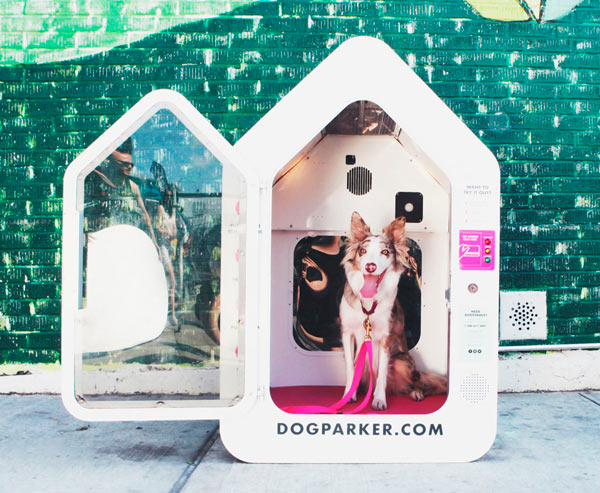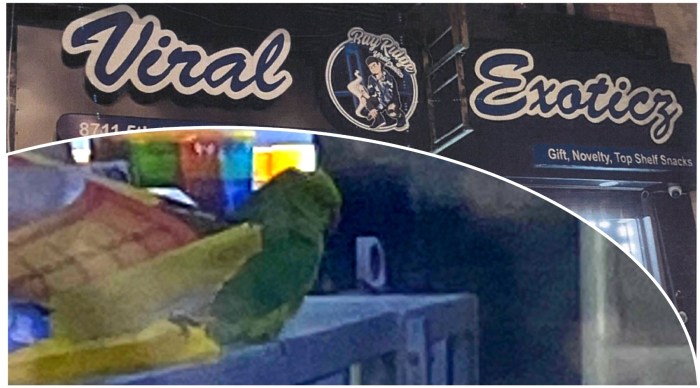The city sent these dogged entrepreneurs to the pound.
Local transit officials forced a Brooklyn-born tech startup that provides canines with curbside kennels to remove its rental doghouses from sidewalks across the borough — after the mayor’s office invited the company’s founders to represent the city at an international tech conference last year.
“It’s a classic situation of the right hand not talking to the left hand,” said Dog Parker co-founder Chelsea Brownridge.
The entrepreneur and her business partner founded Dog Parker in 2014, and its pay-as-you-go pup palaces — which rent by the minute and hour — started popping up outside Kings County storefronts the next year. The company grew to operate more than 40 canine retreats for more than 1,000 active users throughout the borough at its peak, Brownridge said.
Shop owners paid the startup to park its doghouses on sidewalks outside their stores, which allowed customers to securely stow Fido while they did their business inside the establishments.
But unlike coin-operated novelty rides and certain freestanding signs, city code doesn’t specifically permit doghouses on public sidewalks, leading Department of Transportation officials to fire off a letter last November that threatened to round up the company’s kennels, according to an agency rep.
“Everything permitted on sidewalks is there through a legal pathway,” the spokesman said. “One does not exist in this case.”
Brownridge claimed she and her co-founder sought clarity on how to tailor their product and business model to city regulations when they were just getting Dog Parker off the ground, and first contacted various agencies — including the transportation department — for more information back in 2014.
Someone at the agency in response referred Brownridge to a section of the city’s administrative code known colloquially as the “three-foot rule,” which prohibits a property owner from placing an object on the sidewalk more than three feet from his or her building, according to Dog Parker co-founder Todd Schecter.
But that’s where the help ended, according to Schecter, who said agency workers refused the entrepreneurs’ requests to further interpret the law and discuss their business prior to setting it up.
“We had to make our best read of the law, and that’s what we did,” he said. “We didn’t have any clarity from the city.”
The transportation department instead waited to crack the whip until after the company rolled out its doghouses, finally doing so while its founders were attending the 2017 Smart City Expo World Congress in Spain at the request of the Mayor’s Office of Technology and Innovation, according to Brownridge, who said she initially deemed the agency’s threatening missive a simple mistake.
“We thought the first letter was a misunderstanding,” she said. “There was no citation of what the violation was.”
A subsequent meeting with the mayor’s office led Brownridge to believe the city would work with the company, but transit honchos kept threatening to remove its doggy digs, forcing the entrepreneurs to pull nearly all of them from local streets on Feb. 1, she said.
“They were threatening to impound them so we took them off the streets ourselves,” Brownridge said.
The remaining kennels sit safely outside of Brooklyn Public Library’s central branch, beyond the transportation department’s reach because they occupy the property’s lawn, not its sidewalk, according to the co-founder.
Local lawmakers including councilmen Steven Levin (D–Williamsburg) and Rafael Espinal (D–Bushwick) took up Dog Parker’s cause after its founders removed their puppy pads, promising to revise the regulations used to stifle the small business.
“Instead of supporting this business, the city is using antiquated regulations to essentially put them out of NYC’s market,” Espinal said. “I am … exploring legislative solutions so that our laws do not limit the potential of innovative companies like this one.”
And Schecter said Dog Parker isn’t waiting on the city to make its next move — the company is already in talks with mayors of other municipalities to bring its brand of canine condos around the world.
“We’re gearing up to go to dozens of cities,” he said.
Reps from the Mayor’s Office of Technology and Innovation did not respond to a request for comment.

















